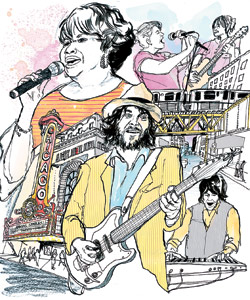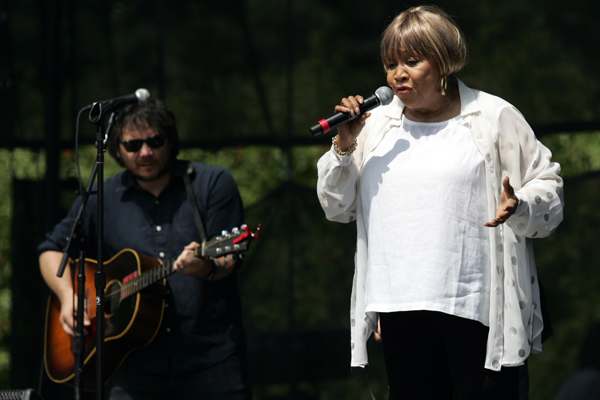Staples and Tweedy perform together at Lollapalooza Music Festival on August 6th, 2010.
Mavis Staples has worked with some of the finest names in music: Bob Dylan, The Band, Booker T. and the MGs, Prince. Topping the list are her father, the guitarist and singer Pops Staples, and her siblings in The Staple Singers, the gospel-pop group that produced some of the greatest anthems of the civil rights era. But when she was told Jeff Tweedy of Wilco wanted to produce her next album, the 71-year-old music veteran had one reaction: “Oh, shucks, that’s great!”
Y ou Are Not Alone (Anti-), out September 14th, is a homegrown affair. The seed was planted two years ago at the Hideout, where Staples recorded a live album that would end up nominated for a Grammy. Only 100 or so people were lucky enough to squeeze into the room that night; Tweedy was one of them. Two weeks later, he and Staples met up at a Hyde Park restaurant and shared a meal that stretched over two hours. “He told me about his family,” Staples says. “That’s a good thing. He’s a family man. Something Pops always told us, he said, ‘The family is the strongest unit in the world. If you stick with your family, nobody can tear you down or break you.’ I heard that in [Tweedy].”
ou Are Not Alone (Anti-), out September 14th, is a homegrown affair. The seed was planted two years ago at the Hideout, where Staples recorded a live album that would end up nominated for a Grammy. Only 100 or so people were lucky enough to squeeze into the room that night; Tweedy was one of them. Two weeks later, he and Staples met up at a Hyde Park restaurant and shared a meal that stretched over two hours. “He told me about his family,” Staples says. “That’s a good thing. He’s a family man. Something Pops always told us, he said, ‘The family is the strongest unit in the world. If you stick with your family, nobody can tear you down or break you.’ I heard that in [Tweedy].”
All this time, the Wilco frontman was writing songs for her, including what would become the album’s title track, a soulful, down-tempo folk tune with a deep midnight groove. Staples was offered the chance to record the album outside of Chicago, but after she visited Wilco’s studio on the Near Northwest Side, she saw no reason to leave. The sessions last winter became “a love fest”: visiting children, catered meal breaks, Food Network marathons, and first-time collaborations among her touring band and Chicago notables. The country-soul singers Kelly Hogan and Nora O’Connor, Wilco’s Pat Sansone, and Mark Greenberg of the Coctails all appear on the album.
In fact, Hogan could be considered the catalyst, since she had introduced Staples to the Hideout years earlier. She remembers Tweedy conducting all the recordings for the new album—including one take he recorded in the building’s freezing stairwell to capture its natural reverb. The immediacy forced the singers to become “natural blood brothers,” she says. “Those harmonies were insane.”
In addition to lost songs by John Fogerty, Allen Toussaint, and Randy Newman, Tweedy reintroduced Staples to gospel traditionals from the Reverend Gary Davis and others that she recalled hearing as a child on her father’s 78 rpm player. “These songs were older than me. I never thought I would be singing them again,” she says.
Following a string of well-received comeback albums this past decade, Staples considers the new collection a revelation. “I’ve been singing a long time. For a youngster like [Tweedy] to want to work with me . . . He reached out to me, I didn’t ask him. He came. And I just thank the Lord,” she says.
Photograph: Ray Whitehouse; Illustration: Brett Affrunti



